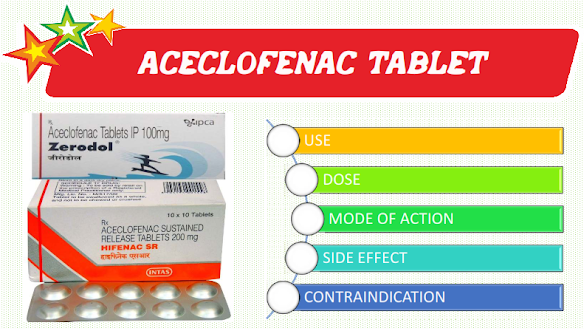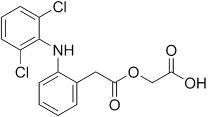ACECLOFANAC
Aceclofenac
•
Aceclofenac is a nonsteroidal anti-inflammatory
drug (NSAID)
•
Analog of diclofenac
• It was patented in 1983 and approved for medical
use in 1992
USE
•
Rheumatoid Arthritis
•
Osteoarthritis
•
Ankylosing Spondylitis
•
Mild to moderate pain
•
Inflammation
DOSE
•
Adults – The recommended dose is 200 mg
daily, taken as two separate 100 mg doses, one tablet in the morning and one in
the evening.
•
Paediatric population – It is not
recommended for use in children under 18 years of age.
PHARMACOLOGY
•
Absorption – rapidly and completely
absorbed from the gastrointestinal tract
•
Volume of distribution – 25L
•
Protein binding – Highly protein-bound
(>99%)
•
Route of elimination – urine (70-80%),
feces (20%)
•
Half-life – approximately 4 hours
•
Clearance – 5 L/h
MACHENISM OF
ACTION
•
Prostaglandins are substances which is
responsible for the sensation of pain, swelling, and inflammation.
•
Aceclofenac is a nonsteroidal anti-inflammatory
drug (NSAIDs) and works by blocking the activity of an enzyme that is
responsible for the formation of prostaglandins, thus relieving pain, swelling
and inflammation.
SIDE EFFECTS
•
Vomiting
•
Stomach pain/epigastric pain
•
Nausea
•
Indigestion
•
Diarrhea
•
Heartburn
•
Loss of appetite
PRECAUTIONS/CONTRAINDICATION
•
Allergies- Avoid if you have a known
allergy to Aceclofenac or other ANSIDs.
•
Asthma- Not recommended if you have been
diagnosed with asthma.
•
Bleeding – Aceclofenac is not recommended
if you have any bleeding disorder. It may cause severe swelling and bleed in
the stomach, colon, and anus.
•
Pregnancy- This medicine is not
recommended in pregnant women.
•
Breast-nutrition- This medicine is not
recommended for breastfeeding women.
•
Gastrointestinal bleeding- Cause severe
bleeding when taken for a long time. Elderly populations with a history of
gastrointestinal disease are at higher risk.
•
Cardiac surgery- Not be used to relieve
pain before or after CABG (coronary artery bypass surgery).
•
Kidney- Not recommended if you have
impaired kidney function.
•
Liver- Use with caution with an initial
dose of 100 mg once daily for mild liver failure. Contraindicated in the severe
failure of the liver.
Interaction
with Medicine
•
Corticosteroids – Moderate
•
Antihypertensives – Severe
•
Digoxin– Severe
•
Warfarin– Severe
•
Lithium– Severe
FAMOUS
BRANDS
|
BRAND NAME |
COMPANY |
MRP |
|
ZERODOL TABLETS |
IPCA |
51.45 |
|
HIFENAC TABLETS |
INTAS |
52.00 |
|
DOLOKIND 100MG TABLETS |
MANKIND |
32.10 |
|
ACECLO TABLETS |
ARISTO |
48.00 |
|
ACENAC TABLETS |
MEDLEY |
45.50 |
|
MOVON TABLETS |
IPCA |
41.10 |
|
DOLOWIN TABLETS |
MICRO |
51.00 |
|
ACENEXT 100MG TABLETS |
CADILA |
24.50 |
|
ACEMIZ 100MG TABLETS |
LUPIN |
67.00 |
|
DOLOSTAT 100MG TABLETS |
BLUE CROSS |
35.00 |
|
EQUIDOL 100MG TABLETS |
AKUMENTIS |
75.00 |

